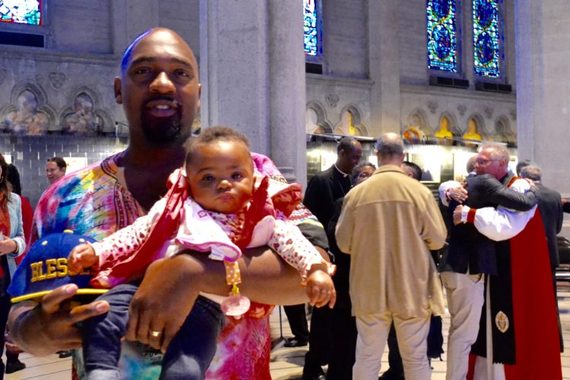
Justin Wooley, a member of the Peninsula Multifaith Coalition, said of the Interfaith Vigil for Peace at Grace Cathedral that he attended with his daughter, "No one professed their race, religion, age or sexuality; we just walked into a room full of peace."
When I was a little boy, I didn't know the difference between white people and black people. I didn't know the difference between gay people and straight people. I didn't know the difference between citizens and immigrants, Republicans and Democrats, Muslims, Christians, Jews and atheists. When I was a little boy, I just felt open to the world as it was and as it felt.
We recently discovered family films from the days when I was a child that I had never seen before. I can't tell you how powerful it felt to see those images of people who I love and who have died. My grandparents and great aunts and uncles and others came alive on the screen.
What struck me most profoundly is how uninhibited I was. I would walk around with my tongue out because I liked the feel of the wind. I saw images of me as a two-year-old, walking in water up to my shins. The whole way I moved stirred a deep memory in me of the pleasure of feeling the resistance of that water in such a wonderful new way.
Do you know what activity recurred most often in the films? It was dancing. It seems as if, as a child, every time I heard music I could not stop myself from moving. It was almost as if I became part of the music. Jean Piaget and other experts in child development say that when young children draw they are not trying to form a representative of some outside thing. They are not trying to draw something that looks like something else. They become part of the art themselves.
These days, I never dance. Sometimes, I hardly notice what it feels like to be alive. Somewhere, I learned to hide and suppress what my body really wants to do.
Robert Bellah taught at UC Berkeley for decades. He asks what it means to be human. Anthropologists distinguish between what they call online and offline behaviors. Online is what we do to get food and survive and pass on our genes. Offline is what we do during all the other times, as we make music and draw pictures and tell jokes. Bellah suggests that play may be the most important thing we do.
The purpose of a symphony or a rock ballad or an old school hip-hop song is not to reach the end. It is to play -- to lose yourself in something that is a symbol of itself.
The recent violence in Istanbul, Baghdad, Baton Rouge, St. Paul, the murder of police officers in Dallas is taking its toll on all of us. Last night, I talked with a beautiful, strong young African-American father of a very young baby. He told me he has been having nightmares about being murdered. His wife has started leaving their bedroom door open and the light on in the hall.
You may think, "All this hasn't bothered me that much." But we experience ourselves only as a thin film of rationality over a deep sea of unconscious feeling. We are so much more than what we experience consciously.
Last night, we had an interfaith peace vigil here in the cathedral. As we sang, our bishop, the Rt. Rev. Marc Handley Andrus, began using hand motions for the song in the most utterly unselfconscious way. In that instant, I felt both a deep longing from my childhood to join him along with all the embarrassment reinforced over so many years that someone would see me doing it.
Wanika Stephens, a minister and pastor at Saint John Coltrane Church, gave a short talk about how we need to look carefully at ourselves in the mirror and then to begin polishing that mirror until it is so perfect that we can see each other's image reflected in it. At the very end, we sang "We Shall Overcome." The person next to me reached out her hand, and I took it.
When I was a little boy, I did not know the difference between white people and black people -- and neither did you. Can we grow closer to that child of God we once were? Can we begin again to experience the world as it is? Can we draw nearer to seeing the beauty in every soul?
Will you dance with me?
The original article appeared in the San Francisco Examiner.
To read sermons and yoga meditations that I give at Grace Cathedral or listen to them as podcasts, click here.